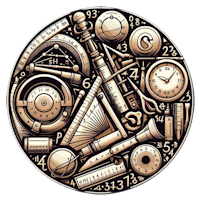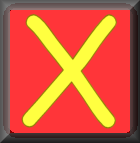
 |
Circles - Using π - Level 1Practise using pi to calculate various circle measurements. |
This is level 1; find the circumference given the radius or diameter. Give your answers correct to three significant figures. You can earn a trophy if you get at least 7 correct. The diagrams are not drawn to scale.
InstructionsTry your best to answer the questions above. Type your answers into the boxes provided leaving no spaces. As you work through the exercise regularly click the "check" button. If you have any wrong answers, do your best to do corrections but if there is anything you don't understand, please ask your teacher for help. When you have got all of the questions correct you may want to print out this page and paste it into your exercise book. If you keep your work in an ePortfolio you could take a screen shot of your answers and paste that into your Maths file. |
||
|
|
||
|
|

|
More Activities: |
|
Mathematicians are not the people who find Maths easy; they are the people who enjoy how mystifying, puzzling and hard it is. Are you a mathematician? Comment recorded on the 9 April 'Starter of the Day' page by Jan, South Canterbury: "Thank you for sharing such a great resource. I was about to try and get together a bank of starters but time is always required elsewhere, so thank you." Comment recorded on the 5 April 'Starter of the Day' page by Mr Stoner, St George's College of Technology: "This resource has made a great deal of difference to the standard of starters for all of our lessons. Thank you for being so creative and imaginative." |
Whose Idea Was This?Did you enjoy doing this 'Circles - Using pi' activity? Are you curious about who originally came up with this idea in Maths? Discover more about one of the mathematicians who is associated with this concept. 
|
|
AnswersThere are answers to this exercise but they are available in this space to teachers, tutors and parents who have logged in to their Transum subscription on this computer. A Transum subscription unlocks the answers to the online exercises, quizzes and puzzles. It also provides the teacher with access to quality external links on each of the Transum Topic pages and the facility to add to the collection themselves. Subscribers can manage class lists, lesson plans and assessment data in the Class Admin application and have access to reports of the Transum Trophies earned by class members. If you would like to enjoy ad-free access to the thousands of Transum resources, receive our monthly newsletter, unlock the printable worksheets and see our Maths Lesson Finishers then sign up for a subscription now: Subscribe |
||
Go MathsLearning and understanding Mathematics, at every level, requires learner engagement. Mathematics is not a spectator sport. Sometimes traditional teaching fails to actively involve students. One way to address the problem is through the use of interactive activities and this web site provides many of those. The Go Maths page is an alphabetical list of free activities designed for students in Secondary/High school. Maths MapAre you looking for something specific? An exercise to supplement the topic you are studying at school at the moment perhaps. Navigate using our Maths Map to find exercises, puzzles and Maths lesson starters grouped by topic. | ||
Teachers | ||
|
If you found this activity useful don't forget to record it in your scheme of work or learning management system. The short URL, ready to be copied and pasted, is as follows: |
Alternatively, if you use Google Classroom, all you have to do is click on the green icon below in order to add this activity to one of your classes. |
It may be worth remembering that if Transum.org should go offline for whatever reason, there is a mirror site at Transum.info that contains most of the resources that are available here on Transum.org. When planning to use technology in your lesson always have a plan B! |
|
|
||
© Transum Mathematics 1997-2026
Scan the QR code below to visit the online version of this activity.
https://www.Transum.org/go/?Num=333
Close

Level 1 - find the circumference given the radius or diameter.
Level 2 - find the radius or diameter given the circumference.
Level 3 - find the area of a circle given either the radius or diameter.
Level 4 - the areas of circles are given, find either the radius, diameter or circumference.
Level 5 - the radius and angle subtended at the centre of the circle are given, find the length of the arc or area of the sector of the circle.
Level 6 - this level has mixed questions about the circle. Most of these questions will require a multi-part calculation once the situation described in the question has been understood.
Areas of composite shapes requires an ability to calculate the areas of other shapes such as rectangles, triangles and trapezia.
Exam Style questions are in the style of GCSE or IB/A-level exam paper questions and worked solutions are available for Transum subscribers.
Use a calculator for this exercise. All of the calculations you will do involve the number π (pronounced pi) which is roughly equal to 3.141592. You should use the π button on your calculator to get this number into your calculation.
Let r be the radius, d the diameter, C the circumference and A the area of a circle.
C = πd [i.e., to find the circumference multiply the length of the diameter by pi]
A = πr2 [i.e., to find the area multiply the square of the radius by pi]

For arcs multiply the circumference by the angle subtended at the centre and divide by 360.
For sector area multiply the circle area by the angle subtended at the centre and divide by 360.
For help using a calculator with circle calculations see Calculator Workout.
For more on this topic see our Circles page.
Answers to this exercise are available lower down this page when you are logged in to your Transum account. If you don’t yet have a Transum subscription one can be very quickly set up if you are a teacher, tutor or parent.
Close

Fermat's Library, Twitter
Wednesday, January 9, 2019